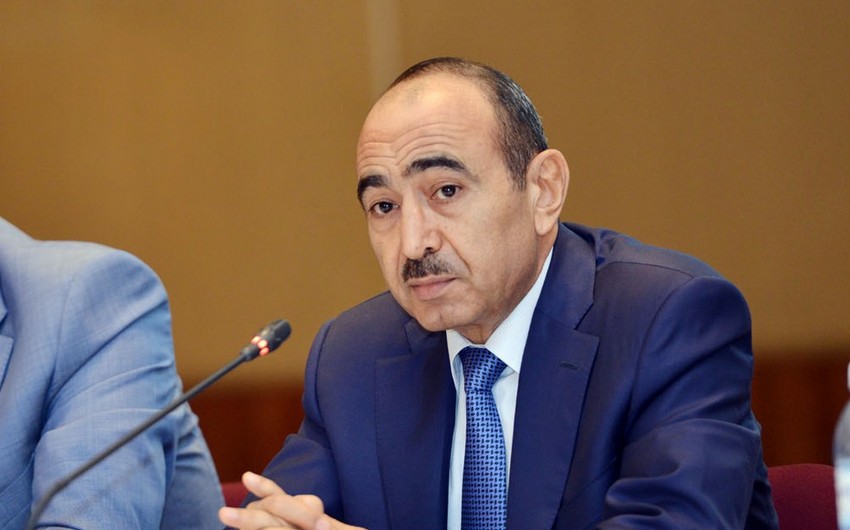Baku. 16 November. REPORT.AZ/ "Of course, Azerbaijan as independent country is not satisfied some powers in Europe pressure and dictate to Azerbaijan what to do. Our country has its own independent policy and we are not going to be dependent on any country".
Report informs, Assistant of the President of the Republic of Azerbaijan on Public Policy, Ali Hasanov said in his interview with NewEurope.
"Unfortunately some powers in Europe are starting to pressure, to dictate to Azerbaijan what to do", A.Hasanov stated.
He said that, with Europe Azerbaijan had a good relationship - energy, communications, transport: "With different countries of the EU we have a good relationship and we continue to have a good relationship".
“In terms of energy security, we opened the doors of the Caspian Sea to Europe and we started to realise energy projects,” Ali Hasanov added. He highlighted a 20-year successful energy partnership that led to constructing many projects, including the Baku-Tbilisi-Ceyhan (BTC) oil pipeline and the Baku-Tbilisi-Erzurum (BTE) gas pipeline.
“I want to especially mention the Southern Gas Corridor (SGC) and the Trans Anatolian Pipeline (TANAP) and the Trans Adriatic Pipeline (TAP) projects,” he said, referring to the EU-backed project to bring gas from Azerbaijan’s giant Shah Deniz 2 field to Europe.
“Azerbaijan also plays an important transport role between Europe and Asia,” he said, adding that the Kars–Tbilisi–Baku railway, a regional rail link project to directly connect Turkey, Georgia and Azerbaijan, will be launched after six months, allowing the transport of goods from China to Europe and vice versa.
He also highlighted his country’s role in the Internet, information and technology sector, noting that many cables go through Azerbaijan connecting the world.
Hasanov noted that since gaining independence in 1992, Azerbaijan and Europe have shared a good, bilateral relationship. “In some ways, Azerbaijan took the way like Europe did towards democracy, human rights, and political pluralism in society. Europe has a good experience in market economy. Azerbaijan is also going to have some experience from this market. We especially paid attention to the liberalisation of the economy. We try to pay attention to all experience that we can get from Europe,” the Azerbaijani official said.
He called for an “equal relationship” based on mutual respect. “We held the elections according to European rules and laws,” he said, referring to the Presidential Elections held in the former Soviet republic on November 1. “Some organisations in Europe under pressure refused to observe elections in Azerbaijan,” he said. “But some members of Europe and European Parliament arrived in Azerbaijan to observe the elections and they have seen that we had a democratic election in Azerbaijan. We think the refusal to observe the elections in Azerbaijan does not assist the bilateral relationship, friendship and cooperation,” Hasanov argued.
Asked if the recent deterioration in EU-Azerbaijan ties will affect the energy projects, Hasanov assured that Azerbaijan is going to continue the policy it has pursued. He said Azerbaijan and the EU have agreed on energy transport and security. “We can sign in the future new contracts based on the bilateral relationships. We also expect from Europe new initiatives and we have our initiatives,” he said.
The EU relies on Azerbaijan to lessen its gas dependence on Russia. But Hasanov said that Baku and Moscow are not competing over the European market. “We don’t think as competitors, we think as colleagues in this field. We provide Europe with alternative gas. Russia has its own market and we have our own market. Europe needs Russian gas but also Azerbaijani gas. We also focus on Turkey with gas and some new markets,” Hasanov said. “Russia has its own traditional buyers of gas.”
Nagorno-Karabakh and the economy were the main issues that influenced voters at the recent Parliamentary Elections. Hasanov said Nagorno-Karabakh “is not a problem of Azerbaijani people, of the Azerbaijan government, it’s a threat to the whole world. We can see the EU problem with the refugees and in that context we think the Nagorno-Karabakh is also a problem of Europe”.
Hasanov said ethnic separatism is the reason behind many of the new conflicts. “I think in the EU and UN there should be serious steps about solving the Nagorno-Karabakh and other conflicts,” he said.
He said radical Islamism is not a common for Azerbaijan. “From out of the country there are some efforts to bring to Azerbaijan the radical Islam but we prevent successfully their efforts. Azerbaijan historically is not a radical nation,” Hasanov said.
Turning to the effect of the tumbling world oil prices on the economy, he said that oil income of Azerbaijan decreased twice and this is going to also affect state projects. “But in previous years, Azerbaijan could focus on the non-oil sector and because of it, 70% of the economy is in non-oil sector,” he said. “The domestic income of the country is based on the 70% of non-oil and allows solving the social problems of the country. The diversification of the economy in the previous years has started to yield positive results. But the fall of theFeatured is a problem for the region and for Europe.”
The fall of the oil price also influenced Azerbaijan’s national currency, forcing the government to use its national reserves to stabilize the manat. “Since the fall of the oil prices there was only one devaluation in February and it was 33 percent and because of our reserves we can still keep the currency at certain level. We also the government use other stabilisation mechanisms to keep our currency at one position,” he said.


 https://images.report.az/photo/4d308a7c-6211-4ad6-bc4a-e4916929909b.jpg
https://images.report.az/photo/4d308a7c-6211-4ad6-bc4a-e4916929909b.jpg

